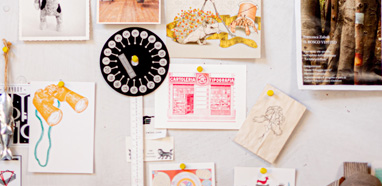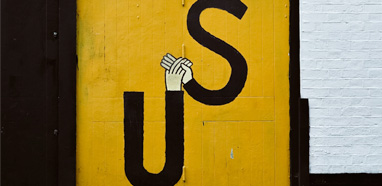As a creative and a human I struggle with self-doubt regularly. Although I’m not one to shy away from taking risks or making changes — I’ve moved countries starting from scratch three times — the self-doubt (to paraphrase a famous space film) is strong in this one. For me, it’s mostly linked to a fear of failure rather than a fear of uncertainty, and a long-term bad romance with perfectionism. In any case, it is a common feeling for most people and a sure-fire way to keep yourself stuck in an underachieving rut. Luckily there are ways to combat it, or at least train yourself to work through it.
Self-doubt happens
Let me say now that you should never feel ashamed for your self-doubt, nor should you berate yourself for feeling this way. First of all, because this will only serve to amplify your insecurity and further undermine your belief in yourself. Second, because it’s perfectly human to feel this way, especially in uncertain times, and sometimes it can’t be helped. And that’s ok.
The problem with self-doubt is not the feeling itself, but how we react and what we do when it grips us. If we surrender to this lack of self-belief it will drag us down like quicksand.
I’ve spent a while in such a situation recently. To me, it looks like a plateau of uncertainty and anxiety where the highway between knowing what I want and believing I can make it happen is paved by self-doubt. And oh boy, it looks like those endless highways out in the American west, flanked by desert and tumbleweeds. An unforgiving place where you can easily get lost and disorientated.
Forget about uncertainty
Let me make a little distinction here between uncertainty and self-doubt. Accepting that uncertainty can easily generate self-doubt and vice versa, I’ve found that being able to distinguish between them makes a big difference in how I deal with my own doubtfulness. I believe most of the general uncertainty people feel in life derives from external influences, from knowing that it’s impossible to know what the future holds, or what’s going to happen next. From seeing lives change in the beat of a second, and from seeing the world change in ways that are beyond our control. Self-doubt, on the other hand, is most definitely an internal process.
It lives in your head and feeds from a lack of trust in your own abilities, as well as from an irrational fear of not having control of yourself.
Realising then that the world will always be uncertain and the only thing you can really have control of is indeed your own self, clearly shows that there is a way out of this vicious circle and the paralysis of self-distrust.
You can’t know the future, nor can you second guess it, so why let that hold you back? Isn’t it enough to have your own brain tell you that you can’t hack it?
There’s always something you can do
Back to the hopeless highway of doubt. I’ve found the hard way that if you stay on that road it will, in fact, lead to nowhere. Unchecked self-doubt leaves you stuck, unable to make the changes you want or venture into new things. Over time this indecision can cleverly disguise itself into a litany of excuses that “release” you from accountability and weaken the power of your free will.
It’s easier to say that you’re not doing something because you “don’t have the time”, or “it’s not really the right time”, or “maybe it’s not the right thing” for you, rather than admit that you don’t believe in your ability to pull it off.
Those excuses mask the underlying (false) self-belief that you’re not good enough and there’s nothing you can do. Of course, nothing’s further from the truth. Whatever the situation there’s always something you can do.
First of all, you can get to know yourself better. Honest self-reflection — done with courage and self-compassion — can help you acknowledge where you are in your life and analyse how you got there. It can help you discover where you want to go from here and how you might get there. Take a moment to re-evaluate your achievements and assess the skills you have and those you can improve on.
It’s important in a time of insecurity to remember your successes and give yourself credit for the things you have done so far.
Allow the strength of your past wins to fuel the pursuit of future goals. Finally, accept that perfectionism and comparison are not helpers but deterrents and embrace your human nature.
Acting is reacting
Secondly, you can activate yourself. I’m not one who believes that just saying “I believe in myself” gives you instant confidence and dispels your insecurities. However, I am a firm believer in actions and if learned anything from my theatre days is that acting is reacting. Nothing will happen if you don’t react against your self-doubt and take action.
When you take action you build confidence and trust in your ability to do things.
Find little things you can do, even if it’s mundane tasks that you’ve been putting off for a while, and get them done. Whether it’s getting a dripping tap fixed, or making a boring work call, or sorting out your cluttered email inbox, accomplishing something every day no matter how small will boost your sense of achievement and your trust in yourself. Not to mention that it will also help attack procrastination issues.
Make a habit of action
This is where The Smart Plan can be instrumental in designing your way out of your self-doubting track. Being able to set a list of tasks for every day of the week in a way that makes them manageable and achievable encourages consistency in your actions.
Make a habit of action and you’ll see your self-doubt diminish with every task you accomplish.
Integrating the bi-weekly reflection of the planner in that routine, also allows you to look at everything that you have accomplished in the last two weeks and take pride in yourself.
So many of us forget to do that when we’re focused on getting things done and the minute we achieve something we move on to the next thing. You should always take the time to acknowledge your wins and give yourself a pat on the back.
Celebrating your successes, big or small, keeps you motivated and paves the way for tackling higher goals with confidence.
Delving into this practice daily is like quietly proving to yourself with each completed task that you can do this. And you know what? You can!
Text by Chryssanthi Kouri, a writer and filmmaker based in London. A curious introvert with an interest in self-development, she enjoys writing about life and human nature.
Photo by Rémi Jacquaint on Unsplash


